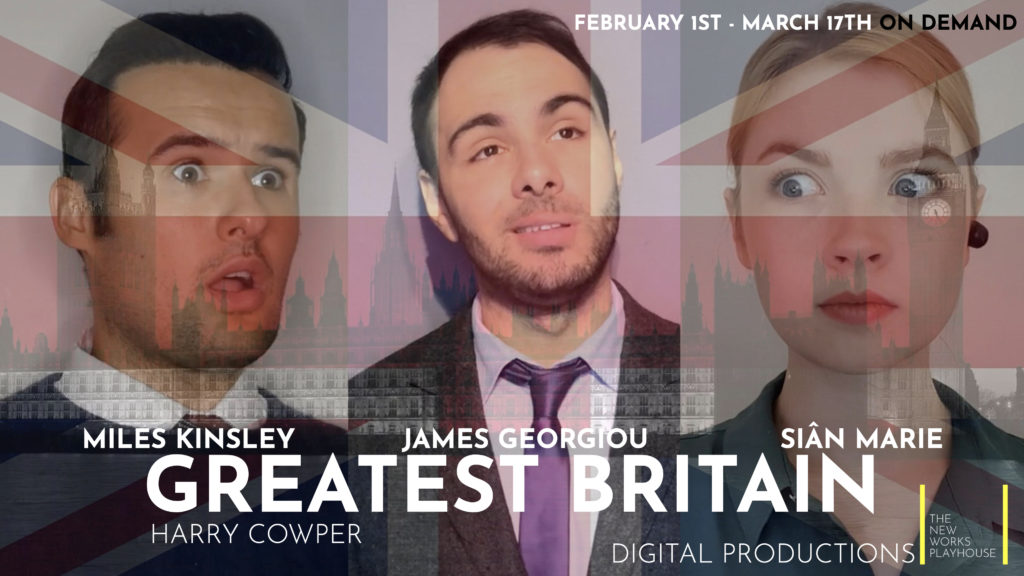Playwright (and London Playwrights member!) Harry Cowper has written a new play, Greatest Britain, which is currently available to stream as a digital production with New Works Playhouse. We chatted to Harry about the play, his ideas, and his writing process.
Can you tell us more about your new play, Greatest Britain, what’s it about?
Greatest Britain is political sitcom set in a totalitarian dictatorship; a sort of Yes Minister does Nineteen Eighty-Four. We follow the career of Rupert, a bumbling, incompetent junior minister, as the country around him descends further into chaos. The play is a dark comedy that asks questions about power, corruption, and our own culpability in allowing fascism to prosper.
What was your inspiration for the idea?
Aside from the general global political situation? I’d wanted to write something about dictatorship for a while really and I’d tried out a few other ideas on this theme before settling on this. The main thing I wanted to do was to dismiss the idea that this sort of control was something that happened to other people, either in the past or in countries far away that have no impact on us. I wanted to ground the fascism in the idea of ‘britishness’ to show that this is something that could easily happen in this country too. I also think it’s important to state that the play is a set in a near future- we still have the chance to change things so we don’t reach this point.
What was your writing process like?
It was quite bitty actually. The writing process started back in 2019 (back when Theresa May was Prime Minister if anyone can even remember back that far). The original version of the play was much more expansive, with the office politics being only one section. Going back over the script though, it was very clear that these were the sections that were really working so I isolated them and made them into a punchier one act play. I then had a table read of the play in early 2021 and whilst re-reading the play for that, I felt that were some unfinished business with the characters. This lead to writing a second act not long after this, where I felt I was able to really dive deeper into the characters and show the consequences of their actions. Since then, I’ve been making tweaks to dialogue, especially with the input of the cast who’ve been able to make the roles their own,
Was it written specifically for a digital production?
No, the play was originally designed for a traditional theatre space. I am currently making plans to produce the play live, so watch this space…
Did you have to make any edits to the script to make it suitable for a digital production?
The play actually lent itself quite well to the medium, as it’s quite dialogue heavy and doesn’t require a lot of physical action. In some ways, I think having it on a screen helps to lean into the sitcom tropes that the script plays with (I did consider briefly including the sound a ‘live’ studio audience into the edit, before realising this was a terrible idea!). The main edits I had to make were mostly little things that would require blocking, such as characters sitting down and simple things like that. I knew in advance that the actors would be recording all of the parts separately from each other, so I had to keep interactions to a minimum. For example, on stage it’s very easy for a character to show someone something on their phone but it’s almost impossible in the digital medium without it looking ridiculous.
How did you get your work produced?
I applied to join the New Works Playhouse at the end of 2020 and had already done a couple of table reads with them, including the first act of Greatest Britain, so I’d already built up a working relationship with them before requesting to do a digital production.
Did you have to do lots of redrafting along the way?
Huge amounts to be honest. It was never anything major, I’d just hear a line being delivered and decide that the phrasing wasn’t quite right or that I could come up with a better joke. I also went into the rehearsals wanting to be really flexible with the script and told the actors that they were always free to make suggestions and changes. I think it’s a really good way to approach new writing, as it allows the characters to develop organically and the actors to really connect with their roles. There’s some stuff in the play that came directly from the actors, the section about Scotland for example derives from a conversation with the cast and is now one of my favourite jokes in it!
Do you have any advice for writers wanting to get their work produced?
I’ll be honest, I’m not sure I’m the best person to give advice, this is the first professional production of my work so it’s all very early days for me. If you pushed me for an answer though, I think the main thing really is perseverance. Just keep sending stuff off, apply for as many opportunities as you can (LPW is a great resource for these) and keep going. The other thing I’d say is get other people to read your plays. It’s really scary to do, and I’m not great at doing it myself, but getting other peoples views and opinions is always invaluable.
You can watch the play until 17th March here.

